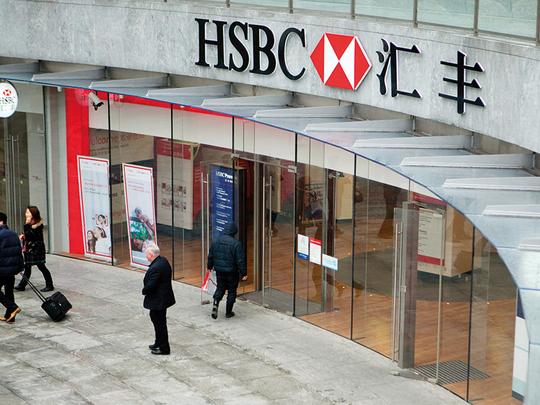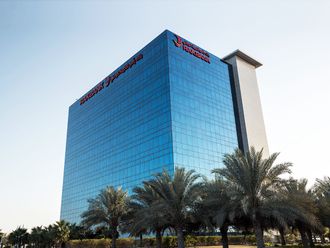
Dubai: HSBC, with its presence across nine markets in the region, is set to play a huge role in investment flows into the Middle East, North Africa and Turkey (MENAT), a senior bank official has said.
The investments will come through Beijing’s Belt and Road Initiative (BRI), Helen Wong, HSBC’s chief executive for Greater China, told Gulf News in a recent interview.
Bank is best positioned to support the BRI need to have strong footprints in Belt and Road markets, and also a universal banking model to offer products across the value chain, from the biggest conglomerates to retail investors and this is where an international bank with substantial Chinese presence fits in.
“On this initiative, we have a principle that we want to be involved in countries where we have a presence. We would like to deal with clients we already know. A lot of investments coming from China are from our existing clients. This makes the assessment of the projects easier and faster,” Wong said.
BRI involves massive investments, initially spanning 65 countries that contribute to 63 per cent of the world’s population and 29 per cent of global GDP.
The purpose of the project is to link up countries in trade that involves movement of people, money and material across the borders. Total infrastructure investments are estimated at more than $8 trillion (Dh29 trillion) .
HSBC’s involvement in BRI-related projects ranges from an advisory role to funding projects that have participation of international contractors and local players.
In these projects a lot of work is done with the involvement of the bank’s local teams in the respective countries.
“If it is a project in the UAE, we will work very closely with the local team. So, both in China and in the UAE, we have clarity on who we are dealing with. I think that presents a lot of opportunities for HSBC as a bank,” Wong said.
HSBC’s association with many of these projects is not going to be limited to project financing. There are other components such as foreign exchange services and handling cross-border payments. “Many Chinese companies who want to set up a presence in Belt and Road markets are our customers in China. Since we have a strong presence in China and know the local business environment well, we are in a great position to serve them very effectively,” Wong said.
UAE in BRI
BRI is expected to result in manifold growth in trade between China and the MENAT region. Trade between China and the UAE is growing rapidly. Last year, trade volumes grew by about 15 per cent and the amount of trade was in excess of $33 billion.
“Trade growth from BRI is not going to be purely between China and the UAE. It will include a lot of trade transiting through the UAE to the wider Middle East, Africa, Europe and beyond. The UAE is a hub that has strong links to other markets in this part of the world. HSBC is fundamentally a trade bank and we want to help develop trade between the MENAT region and China,” Wong said.
China has signed a number of MoUs with the UAE during the recent visit of President Xi Jinping to the UAE. The bank has plans to leverage its strong base in the UAE to reach out to other regional markets, especially Saudi Arabia. Saudi’s economic transformation plan is going to create a number of opportunities for Chinese investors.
BRI in the region involves 13 countries and the cooperation between China and Arab region would focus on energy, core infrastructure trade and investment. As the Middle East adjusts to a lower oil price environment, governments in the region are speeding up both structural and fiscal reforms leading to opening up domestic markets to attract foreign investment across infrastructure, trade, investment, services and supply-chain.
While Chinese state-owned and commercial banks as well as multilateral banks will support BRI funding, the private sector banks will also play a significant role.
This includes arranging bridge financing, equity capital markets, facilitating investments by infrastructure funds and private equity and managing longer-term bond issuance, including green bond issuance for renewable energy.
Most major Chinese banks have a presence in the UAE.
Wong believes this creates opportunities for HSBC rather than direct competition.
“Chinese banks have a different business model to us and we are working closely with many of them as valued clients. If we look at the projects along the BRI, they involve trillions of dollars. Because there is so much to do, banks will need to work together,” Wong said.
Trade war
The impact of a trade war between the US and China is going to have implications for both economies and businesses, the official said.
“As a bank in China, we are obviously dealing with a large number of clients who will be impacted. Even before the tariffs come into force, we are looking closely at what sectors and clients are going to be affected,” said Wong.
Wong believes that Chinese businesses are prepared to face a trade war. China has for some years been migrating from traditional export manufacturing and heavy industries to more high technology, services and domestic consumption driven industries.
In countries such as Vietnam and Thailand, Chinese companies have already set up shop.
“We are talking to customers who want to move their manufacturing to other countries or want to expand their trade with other Asian countries. We see this is already happening and are very excited about the China-ASEAN corridor,” Wong said.
A full-blown trade war is also going have second order impact such as the impact on equity markets, forex markets and interest rates.
China is actively countering the impact with policy changes.
Last Week, the PBOC reduced the reserve requirements and said it was releasing more money into the financial system.
The country is clearly preparing for more monetary and fiscal policy tools to boost the domestic economy.












